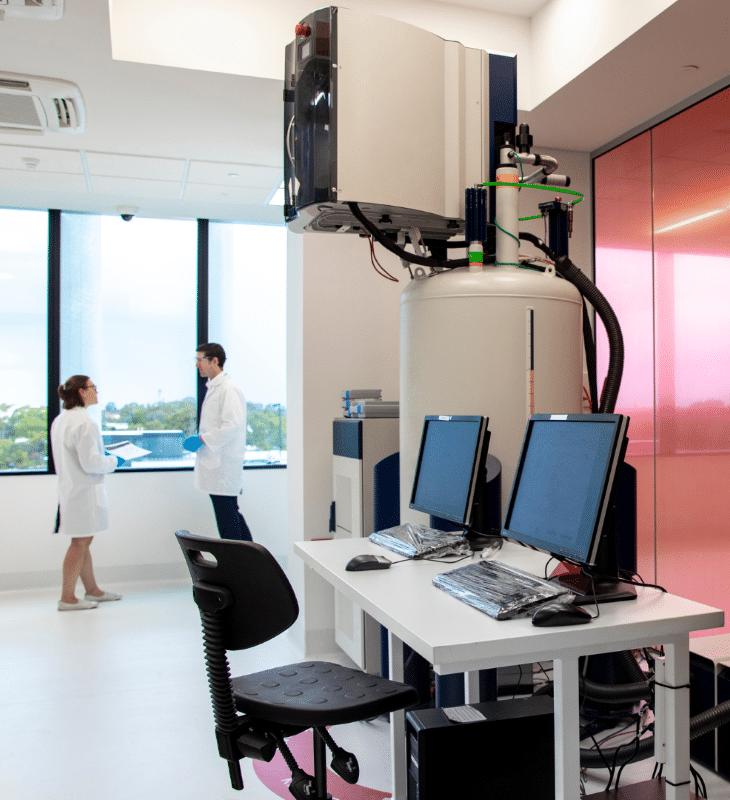Nuclear Magnetic Resonance (NMR) has been a key tool in the study of metabolism and metabolic processes for nearly half a century. With its ability to perform metabolic studies, metabolic profiling, and metabolomics in biofluids and tissues, NMR has established itself as one of the most reliable and versatile techniques in the scientific field. In this article, we want to highlight the main advantages of metabolomics using the NMR technique.
Unique Advantages of NMR
It is a non-destructive technique: NMR allows the analysis of biological fluids without destroying them, thus allowing the use of the same sample for multiple analyses. This is crucial when samples are limited or when preservation for future analysis is required. Additionally, the preparation of biological samples such as feces, tissues, or cell cultures is very simple and includes the use of organic solvents to dissolve the metabolites in them. Depending on the type of solvent used or the combination thereof, we will obtain the aqueous, lipidic, or both fractions in the same process.
Instrumental robustness and stability: NMR instruments are notably robust and offer excellent reproducibility with minimal downtime, which is essential in research environments where time and accuracy are critical.
It allows seeing the structure of molecules: enabling the simultaneous identification and quantification of different metabolites in biological samples.
Does not require markers: Unlike other analytical techniques that may require specific markers, NMR can detect a wide range of metabolites without the need for labels or additional markers.
Quantitative analysis: provides detailed information about the concentrations of metabolites present in a sample, allowing samples analyzed at different times to be comparable.
Shorter time to obtain results: by treating the biological sample in a very simple way and being able to optimize analysis time, results are obtained in less time compared to other analytical techniques.
Cheaper than other technologies: by treating the biological sample in a very simple way and being able to optimize analysis time, the costs per sample are lower when compared to other analytical techniques.
Compatibility with complementary techniques: NMR in metabolomics can be easily combined with other analytical techniques, such as mass spectrometry, to obtain more comprehensive information on the metabolic composition of the samples.
Translation to Clinical Practice: Advances and Applications
NMR offers significant potential for application in clinical practice, standing out for its reproducibility, robustness, and scalability. These characteristics are fundamental in clinical settings, where the accuracy and reliability of results are crucial for medical decision-making. The non-destructive nature of NMR allows the analysis of biological samples without altering their integrity, facilitating multiple analyses and re-analyses if necessary, which is ideal for the longitudinal monitoring of patients. Moreover, the ability of NMR to provide quantitative and detailed data on the chemical composition of samples makes it an invaluable tool for the diagnosis and monitoring of metabolic diseases. With advances in desktop NMR technologies and the reduction in cost and size of equipment, NMR is increasingly accessible to clinical laboratories, allowing its integration into clinical analysis routines and expanding its applications in medical diagnostics and therapeutic assessments.
Furthermore, a concrete example of the successful translation of NMR to clinical practice is the Liposcale test, an advanced test that uses NMR to analyze the lipoprotein profile in detail. This test not only provides an accurate assessment of cardiovascular risk but also offers valuable information about lipid metabolism, highlighting NMR’s ability to facilitate more informed and personalized clinical diagnostics.
The Promise of NMR in the Current Biomedical Landscape
NMR has not only proven to be a versatile and robust technique for biomedical research, but it is also emerging as a key tool in the transition to clinical practice. Thanks to its ability to provide detailed and non-destructive analysis of biofluids and tissues, NMR facilitates a deeper and more accurate understanding of metabolic processes. This understanding is vital for both scientific advancement and clinical application, where accuracy and reproducibility are essential for disease diagnosis and monitoring. As NMR technology continues to evolve, its integration into clinical laboratories becomes more feasible, offering promises of faster, more economical, and accurate diagnostics. The implementation of innovative tests like Liposcale underscores NMR’s potential to transform medical practice, providing advanced diagnostic tools that improve patient care and optimize clinical outcomes.



